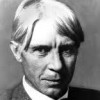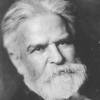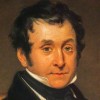The job of getting people really wanting to do something is the essence of leadership. And one of the things a leader needs occasionally is the inspiration he gets from the people he leads. The old tactical textbooks say that the commander always visits his troops to inspire them to fight. I for one soon discovered that one of the reasons for my visiting the front lines was to get inspiration from the young American soldier. I went back to my job ashamed of my own occasional resentments or discouragements, which I probably — at least I hope I concealed them.
Quotations about:
inspiration
Note not all quotations have been tagged, so Search may find additional quotes on this topic.
There are leaders and there are those who lead. Leaders hold a position of power or authority, but those who lead inspire us. Whether they’re individuals or organizations, we follow those who lead, not because we have to, but because we want to. We follow those who lead, not for them, but for ourselves.
Simon Sinek (b. 1973) British-American author and motivational speaker
“How great leaders inspire action,” TED Talk (Sep 2009)
(Source)
Now I think, speaking roughly, by leadership we mean the art of getting someone else to do something that you want done because he wants to do it, not because your position of power can compel him to do it, or your position of authority. A commander of a regiment is not necessarily a leader. He has all of the appurtenances of power given by a set of Army regulations by which he can compel unified action. He can say to a body such as this, “Rise,” and “Sit down.” You do it exactly. But that is not leadership.
My test of the real worth of a man as a preacher is when his congregation go away, saying, not, “What a beautiful sermon!” but “I will do something.”
François de Sales (1567-1622) French bishop, saint, writer [a.k.a. Francis de Sales, b. François de Boisy]
(Attributed)
(Source)
It does not require a majority to prevail, but rather an irate, tireless minority keen to set brush fires in people’s minds.
Man cannot live without hope. If it is not engendered by his own convictions and desires, it can easily be fired from without, and by the most meretricious and empty of promises.
Eleanor Roosevelt (1884-1962) First Lady of the US (1933-45), politician, diplomat, activist
“What Has Happened to the American Dream?” Atlantic Monthly (Apr 1961)
(Source)
If you get stuck, get away from your desk. Take a walk, take a bath, go to sleep, make a pie, draw, listen to music, meditate, exercise; whatever you do, don’t just stick there scowling at the problem. But don’t make telephone calls or go to a party; if you do, other people’s words will pour in where your lost words should be. Open a gap for them, create a space. Be patient.
Hilary Mantel (b. 1952) English writer
In “Ten Rules for Writing Fiction,” The Guardian (20 Feb 2010)
(Source)
The Muse was suddenly there for Dad.
The Truth lay easy in his mind.
The Subconscious lay saying its say, untouched, and flowing off his tongue.
As we must learn to do in our writing.
As we can learn from every man or woman or child around us when, touched and moved, they tell of something they loved or hated this day, yesterday, or some other day long past. At a given moment, the fuse, after sputtering wetly, flares and the fireworks begin.
Oh, it’s limping crude hard work for many, with language in their way. But I have heard farmers tell about their very first wheat crop on their first farm after moving from another state, and if it wasn’t Robert Frost talking, it was his cousin, five times removed. I have heard locomotive engineers talk about America in the tones of Thomas Wolfe who rode our country with his style as they ride it in their steel. I have heard mothers tell of the long night with their firstborn when they were afraid that they and the baby might die. And I have heard my grandmother speak of her first ball when she was seventeen. And they were all, when their souls grew warm, poets.Ray Bradbury (1920-2012) American writer, futurist, fabulist
“How to Keep and Feed a Muse,” The Writer (1961-07)
(Source)
Reprinted in Bradbury, Zen in the Art of Writing (1990).
Do not place a photograph of your favourite author on your desk, especially if the author is one of the famous ones who committed suicide.
Roddy Doyle (b. 1958) Irish novelist, dramatist, screenwriter
In “Ten Rules for Writing Fiction,” The Guardian (20 Feb 2010)
(Source)
I used to be very revolutionary, but now I think that nothing can be gained by brute force. People must be drawn to good by goodness.
Boris Pasternak (1890-1960) Russian poet, novelist, and literary translator
Doctor Zhivago [До́ктор Жива́го], Part 2, ch. 8 “Arrival,” sec. 5 [Yury] (1955) [tr. Hayward & Harari (1958), US ed.]
(Source)
Alternate translations:
I used to be very revolutionary-minded, but now I think that nothing can be gained by violence. People must be drawn to good by goodness.
[tr. Hayward & Harari (1958), UK ed.]
I used to be in a very revolutionary mood, but now I think that we'll gain nothing by violence. People must be drawn to the good by the good.
[tr. Pevear & Volokhonsky (2010)]
Example has more followers than reason. We unconsciously imitate what pleases us, and insensibly approximate to the characters we most admire. In this way, a generous habit of thought and of action carries with it an incalculable influence.
Christian Nestell Bovee (1820-1904) American epigrammatist, writer, publisher
Intuitions and Summaries of Thought, Vol. 1, “Example” (1862)
(Source)
There, peeping among the cloud-wrack above a dark tor high up in the mountains, Sam saw a white star twinkle for a while. The beauty of it smote his heart, as he looked up out of the forsaken land, and hope returned to him. For like a shaft, clear and cold, the thought pierced him that in the end the Shadow was only a small and passing thing: there was light and high beauty for ever beyond its reach.
J.R.R. Tolkien (1892-1973) English writer, fabulist, philologist, academic [John Ronald Reuel Tolkien]
The Lord of the Rings, Vol. 3: The Return of the King, Book 6, ch. 2 “The Land of Shadow” (1954)
(Source)
Good judgment in our dealings with others consists not in seeing through deceptions and evil intentions but in being able to waken the decency dormant in every person.
Eric Hoffer (1902-1983) American writer, philosopher, longshoreman
The Passionate State of Mind, Aphorism 141 (1955)
(Source)
And is he dead whose glorious mind
Lifts thine on high?
To live in the hearts we leave
Is not to die!
As they sang the hobbit felt the love of beautiful things made by hands and by cunning and by magic moving through him, a fierce and a jealous love, the desire of the hearts of dwarves.
J.R.R. Tolkien (1892-1973) English writer, fabulist, philologist, academic [John Ronald Reuel Tolkien]
The Hobbit, ch. 1 “An Unexpected Party” (1937)
(Source)
Be noble! And the nobleness that lies
In other men, sleeping, but never dead,
Will rise in majesty to meet thine own.James Russell Lowell (1819-1891) American diplomat, essayist, poet
“Sonnet 4” (1840)
(Source)
Often presented as a simple sentence, rather than lines within a larger poem.
Whether we believe the Greek poet, “it is sometimes even pleasant to be mad”, or Plato, “he who is master of himself has knocked in vain at the doors of poetry”; or Aristotle, “no great genius was without a mixture of insanity”; the mind cannot express anything lofty and above the ordinary unless inspired. When it despises the common and the customary, and with sacred inspiration rises higher, then at length it sings something grander than that which can come from mortal lips. It cannot attain anything sublime and lofty so long as it is sane: it must depart from the customary, swing itself aloft, take the bit in its teeth, carry away its rider and bear him to a height whither he would have feared to ascend alone.
[Nam sive Graeco poetae credimus ‘aliquando et insanire iucundum est,’ sive Platoni ‘frustra poeticas fores compos sui pepulit,’ sive Aristoteli ‘nullum magnum ingenium sine mixtura dementiae fuit’: non potest grande aliquid et super ceteros loqui nisi mota mens. Cum vulgaria et solita contempsit instinctuque sacro surrexit excelsior, tunc demum aliquid cecinit grandius ore mortali. Non potest sublime quicquam et in arduo positum contingere, quam diu apud se est; desciscat oportet a solito et efferatur et mordeat frenos et rectorem rapiat suum eoque ferat, quo per se timuisset escendere.]
Seneca the Younger (c. 4 BC-AD 65) Roman statesman, philosopher, playwright [Lucius Annaeus Seneca]
Moral Essays, “On Tranquility of Mind [De Tranquillitate Animi],” 17.10 [tr. Langsdorf (1900)]
(Source)
I am of the opinion that my life belongs to the whole community and as I live it is my privilege to do for it whatsoever I can. I want to be thoroughly used up when I die, for the harder I work the more I live. I rejoice in life for its own sake. Life is no “brief candle” to me; it is a sort of splendid torch which I’ve got a hold of for the moment and I want to make it burn as brightly as possible before handing it on to future generations.
George Bernard Shaw (1856-1950) British playwright and critic
“Art and Public Money,” speech, Municipal Technical College and School of Art, Brighton (1907-03-06)
(Source)
This is the "official" version that shows up in Archibald Henderson, George Bernard Shaw: His Life and Works, ch. 16 (1911), as the final words. A variant version from the reporter's notes was published in the Sussex Daily News (1907-03-07):
I consider my life belongs to the whole community, and while I last it is my privilege to do what I can for it. I want to be worn out, because the harder I am working, the more I live. I enjoy like for its own sake. It is no "brief candle" for me. It is a sort of glorious torch, which I have got the hold of for the moment, and I want to make it blaze brighter before I hand it on to future generations.
For the "brief candle" reference, see Shakespeare.
This passage is sometimes quoted incorrectly preceded by a passage in the "Epistle Dedicatory to Archibald Henderson" to Man and Superman (1903). This error may have come from Stephen Covey, who identified the chimera as one of his favorite quotations.
When you see someone who is worthy, concentrate upon becoming their equal; when you see someone who is unworthy, use this as an opportunity to look within yourself.
[見賢思齊焉、見不賢而內自省也。]
Confucius (c. 551- c. 479 BC) Chinese philosopher, sage, politician [孔夫子 (Kǒng Fūzǐ, K'ung Fu-tzu, K'ung Fu Tse), 孔子 (Kǒngzǐ, Chungni), 孔丘 (Kǒng Qiū, K'ung Ch'iu)]
The Analects [論語, 论语, Lúnyǔ], Book 4, verse 17 (4.17) (6th C. BC – AD 3rd C.) [tr. Slingerland (2003)]
(Source)
(Source (Chinese)). Alternate translations:
When we see men of worth, we should think of equaling them; when we see men of a contrary character, we should turn inwards and examine ourselves.
[tr. Legge (1861)]
When you meet with men of worth, think how you may attain to their level; when you see others of an opposite character, examine yourself.
[tr. Jennings (1895)]
When we meet with men of worth, we should think how we may equal them. When we meet with worthless men, we should turn into ourselves and find out if we do not resemble them.
[tr. Ku Hung-Ming (1898)]
When you see a man of worth, think how to rise to his level. When you see an unworthy man, then look within and examine yourself.
[tr. Soothill (1910)]
See solid talent and think of measuring up to it; see the un-solid and examine your own insides.
[tr. Pound (1933)]
In the presence of a good man, think all the time how you may learn to equal him. In the presence of a bad man, turn your gaze within!
[tr. Waley (1938)]
When you see a man of the highest caliber, give thought to attaining his stature. When you see one who is not, go home and conduct a self-examination.
[tr. Ware (1950)]
When you meet someone better than yourself, turn your thoughts to becoming his equal. When you meet someone not as good as you are, look within and examine your own self.
[tr. Lau (1979)]
When you come across a superior person, think of being equal to him. When you come across an inferior person, turn inwards and examine yourself.
[tr. Dawson (1993)]
When you see a worthy man, seek to emulate him. When you see an unworthy man, examine yourself.
[tr. Leys (1997)]
On seeing a worthy man, think of equalling him; on seeing an unworthy man, examine yourself inwardly.
[tr. Huang (1997)]
One should think to follow the sagaciousness when one sees it; One should examine onceself when one sees the no sagaciousness.
[tr. Cai/Yu (1998), #83]
When you meet persons of exceptional character think to stand shoulder to shoulder with them; meeting persons of little character, look inward and examine yourself.
[tr. Ames/Rosemont (1998)]
When he sees a worthy man, let him think how he might come up to him; when he sees an unworthy man, let him examine within himself.
[tr. Brooks/Brooks (1998)]
In the presence of sages, you can see how to perfect your thoughts. In the presence of folls, you must awaken yourself.
[tr. Hinton (1998)]
When you see a worthy person, think about how you can equal him. When you see an unworthy person, reflect on your own conduct.
[tr. Watson (2007)]
When you meet a worthy person, think how you could become his equal. When you meet an unworthy person, turn inward and examine your own conduct.
[tr. Chin (2014)]
When you meet a virtuous person, you should strive to emulate his virtues. When you meet a person void of virtue, you should consider whether you have the same flaws.
[tr. Li (2020)]
I was asking myself these questions, weeping all the while with the most bitter sorrow in my heart, when all at once I heard the sing-song voice of a child in a nearby house. Whether it was the voice of a boy or a girl I cannot say, but again and again it repeated the refrain “Take it and read, take it and read.”
[Dicebam haec et flebam amarissima contritione cordis mei. Et ecce audio vocem de vicina domo cum cantu dicentis et crebro repetentis, quasi pueri an puellae, nescio: “tolle lege, tolle lege.”]
Augustine of Hippo (354-430) Christian church father, philosopher, saint [b. Aurelius Augustinus]
Confessions, Book 8, ch. 12 / ¶ 29 (8.12.29) (c. AD 398) [tr. Pine-Coffin (1961)]
(Source)
Augustine writes of being unable to break himself away from his life of carnal sin, until, at this moment, he gets what he deems an inspiration from God to open the Bible at random and, reading Romans 13:13-14, makes his full conversion to Christianity.
(Source (Latin)). Alternate translations:
So was I speaking and weeping in the most bitter contrition of my heart, when, lo! I heard from a neighbouring house a voice, as of boy or girl, I know not, chanting, and oft repeating, "Take up and read; Take up and read."
[tr. Pusey (1838) and ed. Shedd (1860)]
I was saying these things and weeping in the most bitter contrition of my heart, when, lo, I heard the voice as of a boy or girl, I know not which, coming from a neighbouring house, chanting, and oft repeating, “Take up and read; take up and read.
[tr. Pilkington (1876)]
I spoke thus , and wept in the bitterest sorrow of my heart. And lo, I heard a voice as of a boy or girl from a neighbouring house, I know not which, chanting, and frequently repeating, "Take, read; take, read."
[tr. Hutchings (1890)]
Thus I spoke, weeping in bitter contrition of heart, when, lo, I heard a voice from the neighbouring house. It seemed as if some boy or girl, I knew not which, was repeating in a kind of chant the words, "Take and read, take and read."
[tr. Bigg (1897)]
Such things I said, weeping in the most bitter sorrow of my heart. And suddenly I heard a voice from some nearby house, a boy’s voice or a girl’s voice, I do not know: but it was a sort of sing-song, repeated again and again, “Take and read, take and read.”
[tr. Sheed (1943)]
I was saying these things and weeping in the most bitter contrition of my heart, when suddenly I heard the voice of a boy or a girl -- I know not which -- coming from the neighboring house, chanting over and over again, “Pick it up, read it; pick it up, read it.”
[tr. Outler (1955)]
Such words I spoke, and with most bitter contrition I wept within my heart. And lo, I heard from a nearby house, a voice like that of a boy or a girl, I know not which, chanting and repeating over and over, “Take up and read. Take up and read.”
[tr. Ryan (1960)]
So I spoke, weeping in the bitter contrition of my heart. Suddenly a voice reaches my ears from a nearby house. It is the voice of a boy or a girl (I don’t know which) and in a kind of singsong the words are constantly repeated: “Take it and read it. Take it and read it.”
[tr. Warner (1963)]
Such were my words and I wept in the bitter contrition of my heart. And, see, I heard a voice from a neighbouring house chanting repeatedly, whether a boy’s or a girl’s voice I do not know: "Pick it up and read it, pick it up and read it."
[tr. Blaiklock (1983)]
The glory of friendship is not the outstretched hand, nor the kindly smile nor the joy of companionship; it is the spiritual inspiration that comes to one when he discovers that someone else believes in him and is willing to trust him with his friendship.
There is no great genius without a touch of madness.
[Nullum magnum ingenium sine mixtura dementiae fuit.]
Aristotle (384-322 BC) Greek philosopher
(Attributed)
Attributed to Aristotle in Seneca the Younger, "On Tranquility of Mind [De Tranquillitate Animi]" (17.10) (c. AD 60). (Source (Latin)).
Alternate translations:
This quotation as such is not found in surviving Aristotle. It may either represent something from Aristotle that has been lost since Seneca, or else Seneca fabricating a quote, quoting something spurious, or paraphrasing something Aristotle did write, e.g., his comments about madness/melancholy and poets/prominent talents (here and here). See also the Pseudo-Aristotle, Problemata, Book 30, ch. 1:
- "There is no great genius without a mixture of madness." [Example (1851)]
- "No great genius was without a mixture of insanity." [tr. Langsdorf (1900)]
- "No great genius has ever been without a touch of insanity." [tr. Stewart (1900), "On Peace of Mind"]
- "No excellent soul is exempt from a mixture of madness." [Example (1906)]
- "No great genius has ever existed without some touch of madness." [tr. Basore (1932)]
- "No great genius has ever existed without a dash of lunacy." [tr. Davie (2007)]
- "There was never any great genius without a tincture of insanity." [tr. @sentantiq (2018)]
- "There was never a genius without a tincture of madness."
- "No great mind has ever existed without a touch of madness."
Why is it that all those who have become eminent in philosophy or politics or poetry or the arts are clearly of an atrabilious temperament, and some of them to such an extent as to be affected by diseases caused by black bile, as is said to have happened to Heracles among the heroes? [tr. Forster (1927)]
HENRY: God almighty,
There is some soul of goodness in things evil,
Would men observingly distill it out.
For our bad neighbor makes us early stirrers,
Which is both healthful and good husbandry.
Besides, they are our outward consciences
And preachers to us all, admonishing
That we should dress us fairly for our end.
Thus may we gather honey from the weed
And make a moral of the devil himself.




























